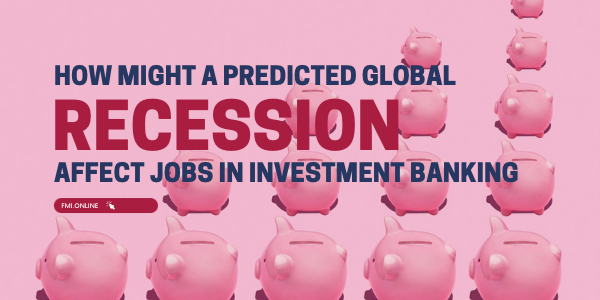Over the past few months, experts have predicted the possibility of a global recession. A recession is defined as a period of economic downturn, marked by a decline in GDP for two successive quarters. One of the most prevalent indicators of a slowdown has been the stock market. Investors across the world have witnessed a significant drop in market indexes over the last few months. The American stock market witnessed a correction of more than 20%, in mid-2022, another key indicator of economic slowdown.
As a result of the slowdown, businesses often resort to layoffs as a cost-cutting initiative or as a result of bankruptcy. So far, from tech companies alone, more than 217,000 employees have been laid off. Since investment banking is primarily focused on economic activity and corporate transactions, (IPOs, M&As, asset management) a recession can severely affect jobs in the investment banking industries. The top five American investment banks saw their revenue decline by nearly 50%, around $19 billion during the last three quarters of 2022. Let’s explore how a global recession could affect jobs in investment banking.
Job cuts and lower bonuses
The financial sector may be experiencing a downturn but it may not always lead to job cuts. According to Bloomberg, top investment banks, the likes of JPMorgan, Bank of America, and Citigroup are considering cutting bonuses by up to 30%, along with job cuts. Johnson Associates, a compensation consulting firm, has reported that investment banks’ incentive pay may fall by more than 45% while the poor performers might end up receiving no bonus payout.
Citigroup and Barclays among others have laid off underperforming bankers. JPMorgan is expected to start downsizing in the current quarter, resulting in attrition without replacement and lower bonus payouts. Similarly, Morgan Stanley said that the bank plans to enact light cuts, along with lower bonuses.
However, this may not be the case at all banks. Credit Suisse has recently been experiencing tough times due to poor risk management and a subdued demand outlook. It is expecting a massive loss of $1.6 billion dollars in the last quarter of 2022. According to Bloomberg, the bank has already started laying off people, as part of a plan to cut costs and aims to reduce about 9,000 positions by 2025.
Increased work hours
In 2021, global markets boomed with IPOs, mergers and acquisitions and SPACs. Due to this increase in business activity, investment banks hired additional employees and paid generous bonuses. Top-tier investment banks paid around $142 billion as employee benefit expenses in 2021. With changing demand outlooks, banks made job cuts and attempted to increase efficiency with the leftover staff, resulting in an increased workload. This can impact the number of working hours and the quality of work-life balance.
Reduced hiring
What does the global recession mean to all those who are planning to enter the industry in the near future?
With these potential economic issues, large investment banks have pulled back their hiring of finance professionals and are aiming for maximum utilisation from their existing employees. On the other hand, boutique investment banks are hiring new employees but at a much smaller scale. They often limit their search to ex-bankers from large institutions with experience and relevant networks.
Opportunity in fintech and distressed asset funds
If you are looking to enter the world of finance you shouldn’t get disheartened. Segments such as distressed asset funds and hedge funds thrive after a fallout. They aim to make a profit from bankrupt companies or companies that are facing temporary problems due to the economic cycle. Moreover, you can also consider starting your career with a fintech company. You can also equip yourself with specialised knowledge on investment banking through in-depth resources like FMI’s Investment Banking course.
Conclusion
With a global recession, investment banks would experience a fall in earnings and subdued demand, which would slow down expansion and fresh hiring. Moreover, as banks have already increased their workforce in the previous year, there is also a possibility of restructuring. On the positive side, small segments of the industry such as distressed funds often thrive in this environment and may expand their operations. With increasing growth in emerging countries, investment banking aspirants can also find job opportunities in indigenous boutique investment/consultancy firms in the country.












 60+ hours
60+ hours 9 courses
9 courses



